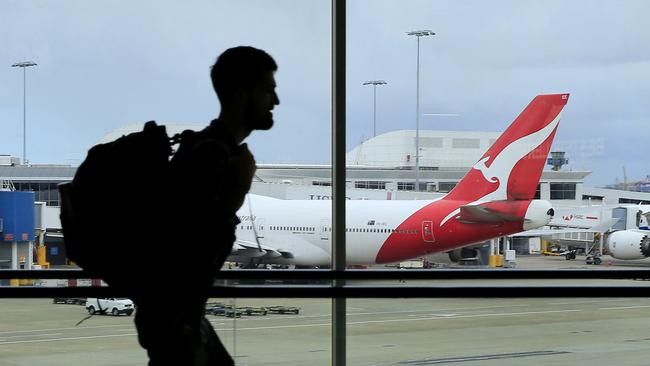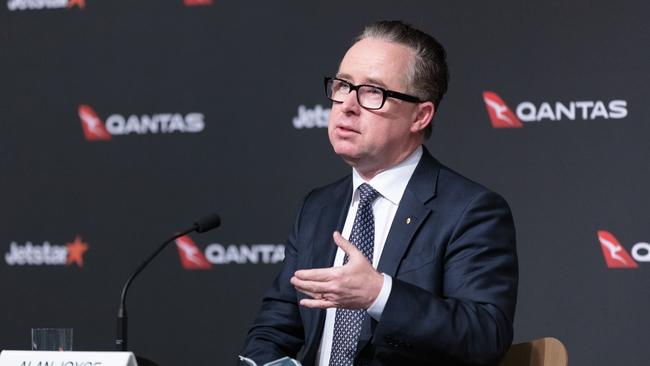Four Covid tests, vaccination proof will be needed to fly with Qantas
Flying overseas will require a minimum of four Covid tests, plus proof of vaccination as Qantas prepares to resume international flights.

Australians boarding Qantas flights to overseas destinations, such as the US and the UK, will undergo a minimum of four Covid tests over the course of their journey and be required to carry digital proof of vaccination.
Speaking in Boston where airline chiefs have gathered for the International Air Transport Association annual general meeting, Qantas boss Alan Joyce provided more details of how overseas travel will look when flights resume next month.
Mr Joyce said they were continuing to work with IATA on the technology for a digital travel pass, to make the experience as automated as possible.
At the behest of government, passengers would be required to undergo a Covid test before departure in Australia, and again before their return flight, as well as two more tests during the seven days of home quarantine.
Mr Joyce stressed Qantas did not believe seven days of quarantine was sustainable, and hoped to see that reduced “quite rapidly” to 72-hours and then removed entirely.
He said until that occurred overseas tourists and business travellers would be unlikely to come to Australia.
“If the virus is circulating in Victoria and New South Wales when the borders open up and the lockdowns have ended, then there’s no more risk from a person coming in from the UK and the US,” said Mr Joyce.
“Certainly we need to move from seven days to get tourists and business travellers to start travelling again.”

There would be checks by both Qantas and Australian Border Force to verify whether a person boarding a flight in London or Los Angeles was vaccinated, had tested negative to Covid, and had a home in which to quarantine.
If a passenger tested positive to Covid-19 before their return flight, it was likely they would have to remain overseas until they were clear of the virus.
Mr Joyce said an app was in development to ensure the home quarantine requirement was fulfilled, using geolocation and facial recognition technology.
“There is a level of trust with this and people who do this will have to follow the rules,” he said.
“There will still be border checks when people get in and there will be requirements on people to tell the truth because they are legal documents.”
Despite the heavy layer of new protocols, Mr Joyce said the response to the first overseas flights on sale in mid-November had been overwhelming, prompting Qantas to add more services within a few hours.
“The planned restart has been made possible by the amazing ramp up of the vaccination rollout,” said Mr Joyce.
“I want to thank the federal government, the Prime Minister, the deputy Prime Minister and the NSW government and we look forward to other states getting on board.”
Mr Joyce was confident the NSW’s pathway to reopening would continue to be followed despite the departure of Gladys Berejiklian, who resigned suddenly last Friday.
“Our belief is that they will stick with that plan, that’s the view we still have,” he said.
Virgin Australia was also seeing strong interest in its first international flights to Fiji scheduled to start on December 23.
The airline remained in talks with government about whether passengers would need to be fully vaccinated to board the services, although the Covid test requirements were likely to be the same as Qantas.
Beyond international travel, Qantas had begun looking for replacements for its ageing domestic fleet, with Mr Joyce confirming the Boeing 737 Max and the Airbus A320neo had been short-listed along with the smaller Airbus A220 and Embraer’s E2 jet family.
A final decision on the preferred supplier was expected by the end of the year, with a firm order to be lodged by mid-2022.
“We’re calling this Project Winton, after the birthplace of Qantas in outback Queensland, because this is a foundational decision for the future of our domestic operations,” Mr Joyce said.
“All of the next-generation aircraft we’re considering have the potential to drive big improvements in trip cost and overall efficiency, and they’re great platforms for delivering a better premium service to our customers.
“Not only will these aircraft deliver a step change in reducing fuel burn and carbon emissions by up to around 15 per cent, we’re talking to each of the manufacturers about how we can accelerate the development and use of sustainable aviation fuels for our domestic flying.”
Under the domestic fleet renewal program, more than 100 new aircraft were due to enter the Qantas fleet by 2034.
Given the size of the order, Mr Joyce said decisions needed to be made soon with the first deliveries expected in 2023.
“We still have our own repair work to do, but we know travel demand will rebound quickly and right now we’re in a strong position to secure the best possible deal at very good prices,” he said.






To join the conversation, please log in. Don't have an account? Register
Join the conversation, you are commenting as Logout